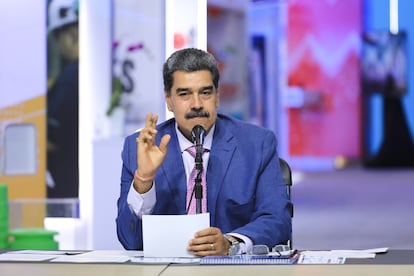Venezuela agrees with the US to resume opposition talks
The meetings that Caracas and Washington have been holding for a year in Doha have paved the way for the Maduro government to return to the negotiating table


The rapprochement between Venezuela and the United States has helped pave the way for a return to negotiations between the government of Nicolás Maduro and the opposition represented by the Unitary Platform. The talks with the opposition began in Mexico in 2021, but had been stalled for a year. The Venezuelan government, however, has now agreed to return to the negotiating table, as reported by Venezuelan newspaper Efecto Cocuyo and confirmed by EL PAÍS. Since last year, envoys from Caracas and Washington have been meeting in secret in Doha — a dialogue that became the main channel to discuss with Maduro an agreement aimed at unblocking the prolonged Venezuelan political conflict.
The United States is stepping up its efforts to pressure Venezuela to hold free and fair presidential elections. While a date for the election has not been set yet, there have been movements in that direction, signalling that some understandings have been reached.
Last week, Vice President Delcy Rodríguez shared photos of her meeting with the Emir of the State of Qatar, Tamim bin Hamad Al Thani, in Doha, hinting at the meetings with the U.S. that are being hosted by the Arab country. Last week, the United States and Venezuela announced the resumption of flights to deport undocumented Venezuelan migrants from the United States. While the U.S. described the flights as deportations, the Maduro government called the measure repatriation.
The Venezuelan government, for its part, is demanding that the U.S. lift sanctions on the state-owned oil company PDVSA, which have made it difficult for Venezuela to market its crude oil. This, in turn, has negatively impacted the country’s economy. But it is not clear, as Reuters has warned, whether the United States would ease sanctions once Venezuela returned to the negotiating table in Mexico, or whether greater overtures would be required.
The Maduro government needs to improve the state of the flailing economy ahead of the presidential election. Inflation is set to hit three digits by the end of 2023 and growth projections have been lowered. On the street, people’s biggest concern continues to be making ends meet, and every day, workers and residents protest the precariousness of salaries. Public services are also failing, with Venezuelans struggling with power outages
Agradecemos a su Alteza Real, Emir del Estado de Qatar, @TamimBinHamad, por recibirnos durante nuestra estadía en su país. Presentamos saludos del Pdte. @NicolasMaduro y del pueblo venezolano. En este afable encuentro ratificamos nuestra intención de afianzar los lazos de… pic.twitter.com/NhsPpzKzEn
— Delcy Rodríguez (@delcyrodriguezv) October 9, 2023
The United States has made some concessions, such as granting licenses to Chevron, Eni and Repsol to revive oil output. In this way, Venezuela could sell crude oil and settle debts that the state oil company has with foreign companies. Reuters reports that progress has been made in these conversations to extend this same scheme to other companies that have requested these exceptions from U.S. authorities. According to the agency, the French company Maurel & Avg may also be granted a license.
On the political and social front, progress has been almost imperceptible. In November of last year, the opposition and the government signed an agreement in Mexico to release $3 billion worth of frozen Venezuelan assets. The money was to be managed by the United Nations, and used for public works and health projects. But these funds have still not materialized. Meanwhile, the opposition continues to call for the release of prisoners and political activists — more than 200 — and guarantees for the presidential elections scheduled for 2024, such as revoking the disqualifications of candidates.
This point took on another dimension this week, when opposition candidate Henrique Capriles decided to drop out of the race, citing his own disqualification as an insurmountable obstacle. He called on the opposition to build a “viable” candidacy to face Maduro in 2024. Leading in the polls is María Corina Machado, who was disqualified nearly as soon as she entered the primary race. She has a wide lead over the other candidates and is set to win the primaries on October 22, which with just two weeks to go are still shrouded in uncertainty.
Sign up for our weekly newsletter to get more English-language news coverage from EL PAÍS USA Edition
Tu suscripción se está usando en otro dispositivo
¿Quieres añadir otro usuario a tu suscripción?
Si continúas leyendo en este dispositivo, no se podrá leer en el otro.
FlechaTu suscripción se está usando en otro dispositivo y solo puedes acceder a EL PAÍS desde un dispositivo a la vez.
Si quieres compartir tu cuenta, cambia tu suscripción a la modalidad Premium, así podrás añadir otro usuario. Cada uno accederá con su propia cuenta de email, lo que os permitirá personalizar vuestra experiencia en EL PAÍS.
¿Tienes una suscripción de empresa? Accede aquí para contratar más cuentas.
En el caso de no saber quién está usando tu cuenta, te recomendamos cambiar tu contraseña aquí.
Si decides continuar compartiendo tu cuenta, este mensaje se mostrará en tu dispositivo y en el de la otra persona que está usando tu cuenta de forma indefinida, afectando a tu experiencia de lectura. Puedes consultar aquí los términos y condiciones de la suscripción digital.








































